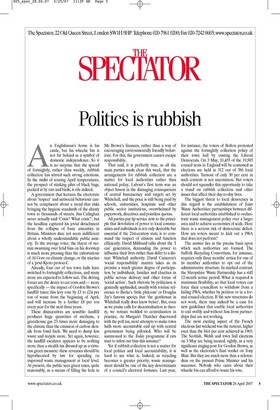Politics is rubbish
An Englishman’s home is his castle, but his wheelie bin is not far behind as a symbol of domestic independence. So it is no surprise that the spread of fortnightly, rather than weekly, rubbish collection has stirred such strong emotions. In the midst of soaring April temperatures, the prospect of stinking piles of black bags, pecked at by rats and birds, is vile indeed.
A government that lectures the electorate about ‘respect’ and antisocial behaviour cannot be complacent about a trend that risks bringing the hygiene standards of the shanty town to thousands of streets. Jim Callaghan never actually said ‘Crisis? What crisis?’, but the headline captured his jovial detachment from the collapse of basic amenities in Britain. Ministers dare not seem indifferent about a wholly understandable public anxiety. To the average voter, the threat of vermin swarming over fetid bins on his doorstep is much more pressing than the exhortations of Al Gore on climate change, or the niceties of a ‘post-Kyoto protocol’.
Already, four out of ten town halls have switched to fortnightly collections, and many more are expected to follow suit. The driving forces are the desire to cut costs and — more specifically — the impact of Gordon Brown’s landfill taxes: this levy rose by £3 to £24 per ton of waste from the beginning of April, and will increase by a further £8 per ton every year for the next three years.
These disincentives are sensible: landfill produces huge quantities of methane, a greenhouse gas 23 times more damaging to the climate than the emission of carbon dioxide from fossil fuels. We need to dump less waste and recycle more. Yet again, however, the landfill escalator appears to be nothing more than a stealth tax dressed up as a virtuous green measure: these revenues should be hypothecated by law for spending on improved waste management at local level. At present, the public sees green taxes, quite reasonably, as a means of filling the hole in Mr Brown’s finances, rather than a way of encouraging environmentally friendly behaviour. For this, the government cannot escape responsibility.
That said, it is perfectly true, as all the main parties made clear this week, that the arrangements for rubbish collection are a matter for local authorities rather than national policy. Labour’s first term was an object lesson in the damaging consequences of central bureaucracy and targets set by Whitehall, and the price is still being paid by schools, universities, hospitals and other public sector institutions, overwhelmed by paperwork, directives and pointless quotas.
All parties pay lip service now to the principle that devolution of power to local communities and individuals is not only desirable but essential if the 21st-century state is to command the respect of citizens and function efficiently. David Miliband talks about the ‘I can’ generation, demanding the power to influence their lives rather than defer to a distant Whitehall authority. David Cameron’s ‘social responsibility’ mantra takes as its premise a much greater degree of participation by individuals, families and charities in public service delivery and other forms of ‘social action’. Such rhetoric by politicians is generally applauded, usually with routine reference to Burke’s ‘little platoons’ or Douglas Jay’s famous aperçu that ‘the gentleman in Whitehall really does know better’. But, even as we praise calls for decentralisation in theory, we remain wedded to centralisation in practice. As Margaret Thatcher discovered with the poll tax, most attempts to make town halls more accountable end up with central government being pilloried. Who will be summoned to the Today programme if rats start to infest our bins this summer?
Yet if rubbish collection is not a matter for local politics and local accountability, it is hard to see what is. Indeed, as recycling becomes a greater priority, waste management should be one of the key determinants of a council’s electoral fortunes. Last year, for instance, the voters of Bolton protested against the fortnightly collection policy of their town hall by ousting the Liberal Democrats. On 3 May, 10,455 of the 19,585 council seats in England will be contested as elections are held in 312 out of 386 local authorities. Turnout of only 30 per cent in such contests is not uncommon. But voters should not squander this opportunity to take a stand on rubbish collection and other issues that affect their day-to-day lives.
The biggest threat to local democracy in this regard is the establishment of Joint Waste Authorities: partnerships between different local authorities established to orchestrate waste management policy over a larger area and to achieve economies of scale. Here there is a serious risk of democratic deficit. How are voters meant to kick out a JWA that does not perform?
The answer lies in the precise basis upon which such authorities are formed. The Suffolk Recycling Consortium, for instance, requires only three months’ notice for one of its member authorities to opt out of the administrative structure. In marked contrast, the Shropshire Waste Partnership has a stiff 12-month notice period. What is required is maximum flexibility, so that local voters can force their councillors to withdraw from a failing JWA, whether by petition or in a formal council election. If the new structures do not work, there may indeed be a case for new guidelines that enable local authorities to exit swiftly and without fuss from partnerships that are not working.
The most exciting aspect of the French elections last weekend was the turnout, higher even than the 84.6 per cent achieved in 1965. The Scottish, Welsh and town hall elections on 3 May are being treated, rightly, as a very significant staging-post for Gordon Brown, as well as the electorate’s final verdict on Tony Blair. But they are much more than a referendum on the present Prime Minister and his successor. Nobody who cares about their wheelie bin can afford to waste his vote.
























































 Previous page
Previous page